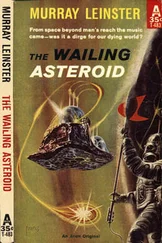"Oh," said Hoddan. "That's too bad."
Things looked ominous. The Lady Fani looked at him strangely. As if she tried to tell him something without speaking it. She looked as if she had wept lately.
"To be sure," said Don Loris fretfully, "you gave me a very pretty present just now. But my retainers tell me that you came back with a ship. A very fine ship. What became of it? The landing grid has been repaired at last and you could have landed it. What happened to it?"
"I gave it away," said Hoddan. He saw what Fani was trying to tell him. One corridor … no, two … leading toward the great hall was filled with spearmen. His tone turned sardonic. "I gave it to a poor old man."
Don Loris shook his head.
"That's not right, Hoddan! That fleet overhead, now. If they are pirates and want some of my men for crews, they should come to me! I don't take kindly to the idea of your kidnaping my men and carrying them off on piratical excursions! They must be profitable! But if you can afford to give me presents like that, and be so lavish with my retainers … why I don't see why—"
Hoddan grimaced.
"I came to arrange a deal on that order," he observed.
"I don't think I like it," said Don Loris peevishly. "I prefer to deal with people direct. I'll arrange about the landing grid, and for a regular recruiting service which I will conduct, of course. But you … you are irresponsible! I wish you well, but when you carry my men off for pirates, and make my neighbors into my enemies, and infect my daughter with strange notions and the government of a friendly planet asks me in so many words not to shelter you any longer … why that's the end, Hoddan. So with great regret—"
"The regret is mine," said Hoddan. Thoughtfully, he aimed a stun–pistol at a slowly opening door. He pulled the trigger. Yells followed its humming, because not everybody it hit was knocked out. Nor did it hit everybody in the corridor. Men came surging out of one door, and then two, to require the attention of his weapons.
Then a spear went past Hoddan's face and missed him only by inches. It buried its point in the floor. A whirling knife spun past his nose. He glanced up. There were balconies all around the great hall, and men popped up from behind the railings and threw things at him. They popped down out of sight instantly. There was no rhythm involved. He could not anticipate their rising, nor shoot them through the balcony front. And more men infiltrated the hall, getting behind heavy chairs and tables, to push toward him behind them as shovable shields. More spears and knives flew.
* * * * *
"Bron!" cried the Lady Fani, throatily.
He thought she had an exit for him. He sprang to her side.
"I … I didn't want you to come," she wept.
There was a singular pause in the clangings and clashings of weapons on the floor. For a second the noises continued. Then they stopped. Then one man popped up and hurled a knife. The clang of its fall was a very lonely one. Don Loris fairly howled at him.
"Idiot! Think of the Lady Fani!"
The Lady Fani suddenly smiled tremulously.
"Wonderful!" she said. "They don't dare do anything while you're as close to me as this!"
"Do you suppose," asked Hoddan, "I could count on that?"
"I'm certain of it!" said Fani. "And I think you'd better."
"Then, excuse me," said Hoddan with great politeness.
He swung her up and over his shoulder. With a stun–pistol in his free hand he headed down the hall.
"Outside," she said zestfully. "Get out the side door and turn left, and nobody can jump down on your neck. Then left again to the gate."
He obeyed. Now and again he got in a pot–shot with his pistol. Don Loris had turned the castle into a very pretty trap. The Lady Fani said plaintively:
"This is terribly undignified, and I can't see where we're going. Where are we now?"
"Almost at the gate," panted Hoddan. "At it, now." He swung out of the massive entrance to Don Loris' stronghold. "I can put you down now."
"I wouldn't," said the Lady Fani. "In spite of the end of me that's uppermost, I think you'd better make for the spaceboat exactly as we are."
Again Hoddan obeyed, racing across the open ground. Howls of fury followed him. It was evidently the opinion of the castle that the Lady Fani was to be abducted in the place of the seven returned spearmen.
Hoddan, breathing hard, reached the spaceboat. He put Fani down and said anxiously:
"You're all right? I'm very much in your debt! I was in a spot!" Then he nodded toward the castle. "They are upset, aren't they? They must think I mean to kidnap you."
The Lady Fani beamed.
"It would be terrible if you did," she said hopefully. "I couldn't do a thing to stop you! And a successful public abduction's a legal marriage, on Darth! Wouldn't it be terrible?"
Hoddan mopped his face and patted her reassuringly on the shoulder.
"Don't worry!" he said warmly. "You just got me out of an awful fix! You're my friend! And anyhow I'm going to marry a girl on Walden, named Nedda. Good–by, Fani! Keep clear of the rocket blast."
He went into the boatport, turned to beam paternally back at her, and shut the port behind him. Seconds later the spaceboat took off. It left behind clouds of rocket smoke.
And, though Hoddan hadn't the faintest idea of it, it left behind the maddest girl in several solar systems.
It is the custom of all men, everywhere, to be obtuse where women are concerned. Hoddan went skyward in the spaceboat with feelings of warm gratitude toward the Lady Fani. He had not the slightest inkling that she, who had twice spoiled her father's skulduggery so far as it affected him, felt any but the friendliest of feelings toward him. He remembered that he had kept her from the necessity of adjusting to matrimony with the Lord Ghek. It did not occur to him that most girls intend to adjust to marriage with somebody, anyhow, and he did not even suspect that it is a feminine instinct to make a highly dramatic and romantic production of their marriage so they'll have something to be sentimental about in later years.
As Hoddan drove on up and up, the sky became deep purple and then black velvet set with flecks of fire. He was relieved by the welcome he'd received earlier today from the emigrants, but he remained slightly puzzled by a very faint impression of desperation remaining. He felt very virtuous on the whole, however, and his plans for the future were specific. He'd already composed a letter to his grandfather, which he'd ask the emigrant fleet to deliver. He had another letter in his mind—a form letter, practically a public–relations circular—which he hoped to whip into shape before the emigrants got too anxious to be on their way. He considered that he needed to earn a little more of their gratitude so he could make everything come out even; self–liquidated; everybody satisfied and happy but himself.
For himself he anticipated only the deep satisfaction of accomplishment. He'd wanted to do great things since he was a small boy, and in electronics since his adolescence, when he'd found textbooks in the libraries of looted spaceships. He'd gone to Walden in the hope of achievement. There, of course, he failed because in a free economy industrialists consider that freedom is the privilege to be stupid without penalty. In other than free economies, of course, stupidity is held to be the duty of administrators. But Hoddan now believed himself in the fascinating situation of having knowledge and abilities which were needed by people who knew their need.
It was only when he'd made contact with the fleet, and was in the act of maneuvering toward a boat–blister on the liner he'd brought back, that doubts again assailed him. He had done a few things—accomplished a little. He'd devised a broadcast–power receptor and a microwave projector and he'd turned a Lawlor drive into a ball lightning projector and worked out a few little things like that. But the first had been invented before by somebody in the Cetis cluster, and the second could have been made by anybody and the third was standard practice on Zan. He still had to do something significant.
Читать дальше







